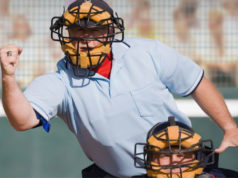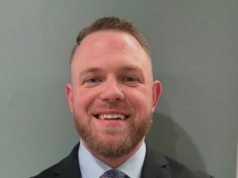Lately, I’ve noticed the silence around a growing cataclysm — the disaster at the Fukushima nuclear plant in Japan. There’s a China syndrome, ongoing, that threatens the entire Pacific Ocean and could also result in a radiation release equal to 15,000 Hiroshima bombs.
And we’re arguing over Obamacare!
It’s tempting to blame our lack of awareness of such an event on the abysmal news media. Imagine if Walter Cronkite had somehow never mentioned the Vietnam War. Now, with the passage of Japan’s new state secrets law, designed to silence criticism of the government and the country’s failed power plant, it’s a fairly safe bet that if the worst comes, we — the little people — will be the last to know. Not that there’s much we could do if we did know, I suppose, other than telling our children to crawl under their desks or deciding to invest in space colonization.
Maybe I’m wrong. Maybe everyone is aware of what’s happening, but they’re choosing to look the other way. Well, why not? We’re already overwhelmed. Record numbers of us are broke, out of work, or just struggling to hang on. Some 50 million Americans are going hungry, and one in five are children. Not many people are looking at that, either — except for those it’s happening to, of course.
There’s a poem by W.H. Auden, in which he talks about the great masters’ understanding of human suffering — how it happens “while someone else is eating or opening a window or just walking dully along; … .” By way of example, he describes a painting by the 16th-century Flemish master, Pieter Bruegel, “Landscape with the Fall of Icarus.”
Bruegel reveals tragedy in the form of a pleasant genre painting. A plowman tills the soil. But elsewhere, Icarus, having flown too close to the sun, has just plunged headfirst into the sea, where he is drowning. We can just see his bare legs, frantically kicking in the green foam. Auden writes, “the ploughman may have heard the splash, the forsaken cry,” but oblivious, he goes on plowing. Meanwhile, his sheep-herding neighbor glances up at the trees, distracted perhaps by the tweet of a bird.
The poem was written in 1938, and Auden was talking about another budding cataclysm that no one seemed to notice, Hitler’s Germany.
The real cataclysm now — and by that, I mean the one behind Fukushima — is, of course, unfettered capitalism, the engine driving our wars, our wrecked economy, and the ruin of our planet. It’s the reason Wal-Mart’s top officers pile up millions while their workers can barely eke out a living, why children sternly prohibited from smoking are working 12-hour days in tobacco fields, and why public schools are closing in record numbers.
It’s why we’re blowing the tops off of mountains and poisoning many millions of gallons of water through fracking. And instead of treating healthcare as a universal right, as most civilized countries do, we go on giving insurance companies dominion over our lives.
If we’re better than this — and I think we are — then maybe it doesn’t have to be this way.
I see signs of change. More people are aware of the obscene gap between rich and poor, hence, more progressives — like Fort Worth’s Wendy Davis in her current bid to be governor — are rising to challenge the entrenched oligarchs. And more are winning all the time.
Meanwhile, across the country, workers from Wal-Mart and fast-food joints are out in the streets, demanding $15 an hour and the right to unionize. There’s growing awareness that we can no longer depend on politics as usual, that real change cannot occur without a fundamental overhaul of our economic system. Which doesn’t mean throwing out Social Security or Medicare or cutting the aid that helps out-of-work people to feed their children.
As I write, Fukushima is spewing 300 tons of poison into the sea every day. The clock is ticking. We either act to save our planet and ourselves or we don’t. But we must also act to make a better world. As the late historian Howard Zinn said, real change seldom occurs from the top down, but from the bottom up. That requires immense creativity. New ways of thinking. And above all, finding our common humanity.
Perhaps now, more than ever, our survival depends on not looking away.
Fort Worth artist and writer Grayson Harper can be reached at poetreb49@gmail.com.













Excellent essay, Grayson. I could not agree more.
Thanks, Don.
Grayson….We’re not better than this now, and will not be better until we decide to be better than this, and then begin working on doing better than this. Everything you criticize is true, and we can and we should do better than this. However, I sort of believe that’s it’s not the way to bet, that it’s going to happen right soon. See, I’ve been broke and poor before & consequently believe that most of us are not really suffering enough to do much more than what we’re seeing done. There’s a price to pay to get anything away from the greedheads in this beautiful country. Reasoning, pleading, threatening, praying for a miracle is all fruitless. Praying for the strength to stand up straight and do what we have to do to take our state and country back is the way to begin. Like you say, Wendy Davis is running for Governor, God bless her. I’ve watched her closely, she’s a stand-up good lady. I intend to do what I can to help her, I don’t know what we’ve done to deserve her.
You’ve always been a standup man, yourself, Benny, and I thank you for that. Your old pal. . .
Harper’s piece has all the trendy Liberal clichés. There’s a plug for Wendy Davis, an implicit endorsement of ObamaCare, a slam against Wal-Mart millionaire-officers, and condemnation of “unfettered capitalism”. Then there are the handy “stats”: 50 million hungry Americans, children working 12-hour days, Fukushima’s 300 tons of daily pollution. The guy’s a frigging encyclopedia.
There is no “unfettered capitalism” in America. For instance, an employer must pay minimum wage, and OSHA dictates work standards. Unfettered capitalism would allow employers and employees to bargain for whatever wages and standards they can agree on. It’s fair to debate whether there should be more or fewer restraints upon free-market capitalism. But to contend that there are NO restraints aka “fetters” is, quite simply, a lie.